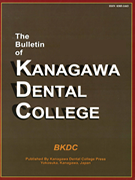- HOME
- > 一般の方
- > バックナンバー:The Bulletin of Kanagawa Dental College
- > 29巻2号
- > アブストラクト
アブストラクト(29巻2号:The Bulletin of Kanagawa Dental College)

English
| Title : | Bruxism as a Stress Management Function of the Masticatory Organ |
|---|---|
| Subtitle : | BKDC CLINICAL AND RESEARCH TOPICS : DAWN OF OCCLUSION - New Aspects of Masticatory Organ |
| Authors : | Sadao Sato*1, Rudolf Slavicek*2 |
| Authors(kana) : | |
| Organization : | *1Department of Orthodontics, Kanagawa Dental College, *2Donau University at Krems, Department of Environment and Medical Center, Center of Interdisciplinary Dentistry |
| Journal : | The Bulletin of Kanagawa Dental College |
| Volume : | 29 |
| Number : | 2 |
| Page : | 101-110 |
| Year/Month : | 2001 / 9 |
| Article : | Report |
| Publisher : | Kanagawa Odontological Society |
| Abstract : | [Abstract] Bruxism is generally defined as a parafunctional clenching and grinding action between the upper and lower teeth. During this activity, extremely strong forces can be applied for time periods exceeding those of functional mastication. These biomechanical loads create many dental problems, such as abfraction, hypersensitivity, periodontal distraction, and temporomandibular dysfunction. Researchers studying bruxism have long discussed psychic stress and emotional tension. It has also been indicated that an aggressive biting is associated with a significant attenuation of stress-induced increases in brain noradrenalin turnover, striatal DOPAC contents and stomach ulcer formation in experimental animals. The concept of stress management is based on the psychological background of bruxism and the benefits attributable to masticatory muscle activity in attenuating stress-related symptoms such as stomach ulcer. The clenching and bruxism function of the masticatory organ is an emergency exit during periods of psychic overloading. Therefore, the occlusion of the masticatory organ contributes significantly to an individual's ability to manage stress. |
| Practice : | Dentistry |
| Keywords : | Masticatory organ, Stress, Bruxism, Occlusion |
